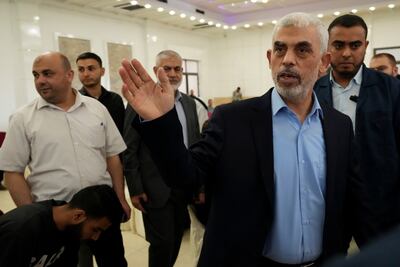Live updates: Follow the latest news on Israel-Gaza
Israel’s government came under more intense criticism on Monday as families of hostages kidnapped by Hamas and other Palestinian factions on October 7 accused ministers of abandoning their loved ones.
Relatives of some of the roughly 240 captives held in Gaza screamed at ministers during an emotional parliamentary session in which far-right politicians rebuked families for assuming they “have a monopoly over pain”.
Representatives of the families were imploring the government to abandon proposals to allow the death penalty for those convicted of terrorism, something relatives fear could lead to retaliatory measures against their captured loved ones, as Israeli forces continue their bombardment of the Gaza Strip.
The bitter exchange came as support for Israel’s right-wing government led by Prime Minister Benjamin Netanyahu plummets and public anger mounts over how the October 7 rampage was allowed to happen, as well as a lack of progress on releasing hostages.
Gil Dickmann, whose cousin Carmel Gat was kidnapped, has spent the past six weeks campaigning on behalf of the captives.
Mr Dickmann said at first the Israeli government was not doing nearly enough to bring his cousin and others home.
“When the war started, I think there were five goals to the war,” Mr Dickmann told The National. "None of them was bringing back the hostages and this was terrifying for us.
“Then we started working, we started appearing in the media, we started yelling, we started making this [issue] appear everywhere and the pictures of the hostages. Now, it's one of the two main goals of the war.”
Mr Dickmann said he will reserve judgment on whether the government has done enough if and when the hostages are returned.
On Monday, the master’s student was one of the activists in the Knesset begging politicians not to pursue the death penalty bill.
“The issue is the fact that you are waving your populist views that only causes damage and risk to the kidnapped because they are now in danger of being killed by Hamas even more than they were before,” Mr Dickmann said of the proposal.

Mr Dickmann said he has tried to avoid getting his hopes up by ignoring reports about a potential hostage release, which appeared at the weekend in The Washington Post.
“It breaks the heart to think that you're going to see your relative in just a few days and then to hear that it was fake news,” he said.
Former hostage negotiator Gershon Baskin, who played a pivotal role in the 2011 release of an Israeli solder kidnapped by Hamas, said the prospect of a deal was currently a “dictate of Hamas rather than an Israeli decision”.
“My sense is that if there’s any kind of reasonable Hamas offer on the table, the Israeli government will agree to it because the pressure is mounting on them to bring the hostages home,” he added.
Reasonable Hamas concessions for the Israelis include the much-discussed option of a five-day ceasefire, the exchange of large numbers of Palestinian prisoners and a significant increase in the amount of humanitarian aid Israel allows to enter the Gaza Strip, Mr Baskin believes.
He does not believe a successful deal – which must be passed in the “next few days” if there is to be one at all – would dampen hostilities between Israel and Hamas in the long-term.
“There is a contradiction [for Israel] here that it is negotiating with the people it is going to kill,” he added.
Israel continues to vow it will totally destroy Hamas, which has been in power in Gaza since 2006.

Mr Baskin says Hamas's leader in Gaza, Yahya Sinwar, has ultimate say in whether the group will agree to a deal.
The negotiator added that the release of Palestinian prisoners was “the most important mission remaining in [Sinwar’s] life”.
“That’s a promise that he made on the day he left prison and left his colleagues behind. It’s a statement that he’s made in every important speech since 2011. I think their release is more important to him that his own personal survival.”


